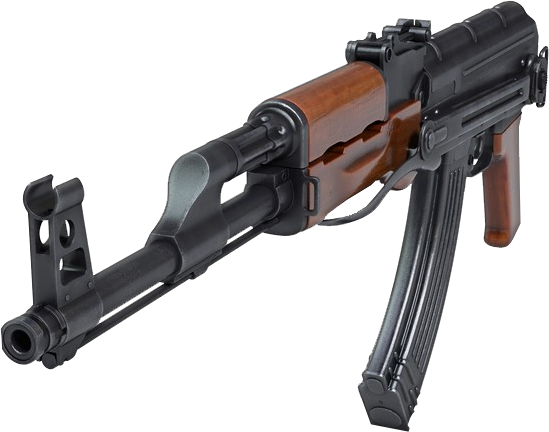The AK RIFLE
The designation AK-47 is often used, generically, to refer to all Kalashnikov-pattern assault rifles.
However, the AK-47 is a specific model of Kalashnikov.
Later Kalashnikov-pattern weapons retain many design features of the AK-47.
Calibre: 7.62 x 39 mm M1943
Length: Fixed stock: 880 mm
Folding stock:Extended: 880 mm / Folded: 645 mm
Weight (unloaded): AK-47: 3.725 kg / AK-47S: 3.980 kg
Barrel length: 417 mm
Feed device: 30-round detachable box magazine
Sighting systems: Fore: Post, adjustable / Rear: U-notch tangent
Operating system: Gas, selective fire
Rate of fire: 600 rds/min
Muzzle velocity: 715 m/s
Model: AK-47 (Type 3)
Caliber: 7.62Χ39 mm
Weight (empty): 3.47 kg
Barrel Length: 415 mm
Rate of Fire (cyclic): ~600 rpm
Muzzle Velocity: 715 m/s
Effective Range: ~800 m

Model: AKM
Caliber: 7.62Χ39 mm
Weight (empty): ~ 3.10 kg
Barrel Length: 415 mm
Rate of Fire (cyclic): 600 rpm (cyclic)
40 semi-auto, ~100 auto
Muzzle Velocity: 715 m/s
Effective Range: ~300–1,000 m (sighting)
Model: AK-74
Caliber: 5.45x39mm
Weight (empty): ~3.07 kg
Barrel Length: 415 mm
Rate of Fire (cyclic): 650 rpm
Muzzle Velocity: 900 m/s
Effective Range: 500 m point / 800 m area target; max 3,150 m
Model: AK-12 / AK-15 / AK-19
Caliber: 5.45Χ39 / 7.62Χ39 / 5.56x45 NATO
Weight (empty): ~3.3 / ~3.5 / ~3.35 kg
Barrel Length: 415 mm
Rate of Fire (cyclic): 700 rpm
Muzzle Velocity: 900 m/s (AK-12), 715 m/s (AK-15), 910 m/s (AK-19)
Effective Range: Up to 1,000 m sighting, max range ~3,150 m
Export & Users
- The AK-47 (and AK family) is one of the most widely used assault rifles globally, serving in at least 106 countries, with an estimated 100 million units in circulation.
- Russia, through Kalashnikov Concern and Rosoboronexport, continues to be a leading supplier of small arms:
• Supplies ~95% of Russia’s domestic small arms.
• Exported over 1 million AK rifles since 2000 to around 30 countries
• Active export partnerships, including the Indo-Russian joint venture producing AK-203 rifles in India, deliver thousands annually
• Major arms-importing countries for Russian weapons (not just AKs but the general portfolio) include India, China, Algeria, Egypt, and Vietnam
• Beyond production, the AK’s cultural and symbolic significance is profound: nations like Mozambique, Zimbabwe, Burkina Faso, and East Timor even depict the Kalashnikov on their national flags or coats of arms
Market & Commerciale
- On the civilian/market side, AKs have become iconic and mass-produced by various manufacturers globally:
- Examples include Romanian WASR-10, Bulgarian SAM‑7, and others. These are popular among enthusiasts and collectors, especially in countries like the U.S.
- The classic design's simplicity, reliability, and lack of patents meant it could be widely produced, licensed, and adapted — fueling diffusion across legal and illicit markets alike.
- Commercially, Russian arms producers ramped up workforce significantly during high export demand periods — Kalashnikov Group hired over 1,700 people in one initiative
- At least 100,000 AKs were exported in a single year (2017) under various contracts, notably from the AK‑100 series (AK‑101, 102, 103, etc.)
Technical: The original AK series evolved from the AK-47’s robust 7.62Χ39 mm design into lighter, more ergonomic, and modular modern rifle families (AK-74, AK-12/AK-15/AK-19).
Export & Use: Over 1 million AK rifles exported since 2000; used in over 100 countries; symbolic presence even features in national emblems.
Commercial: Widely produced by global manufacturers for civilian markets; high demand spurred workforce expansion and export contracts in the range of tens of thousands annually.




